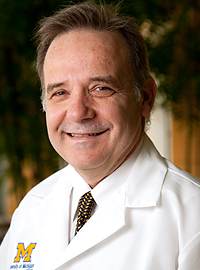Rogel Cancer Center Researcher Named Member of the National Academy of Medicine
Media contact: Ian Demsky, 734-764-2220
Gabriel Nuñez, M.D. was one of three University of Michigan faculty members elected to the National Academy of Medicine
ANN ARBOR, Michigan -- University of Michigan Rogel Cancer Center member Gabriel Nuñez, M.D., is among the new members of the National Academy of Medicine of the National Academies, one of the highest honors in the fields of health and medicine. (The institute was formerly called the Institute of Medicine.)
Nuñez, the Paul de Kruif Endowed Professor of Pathology at Michigan Medicine, was one of three U-M faculty members elected to the NAM in recognition of major contributions to the advancement of the medical sciences, health care and public health.
Nuñez is recognized worldwide as one of the foremost experts in gastrointestinal and systemic inflammation, host-microbial interactions, and mucosal immunology.
Also elected were Rebecca Cunningham, M.D., interim vice president for research, William G. Barsan Collegiate Professor of Emergency Medicine and professor of health behavior and health education at the School of Public Health, and Jim Dalton, Ph.D., dean and professor of pharmaceutical sciences at the College of Pharmacy.
With their election, U-M now has 56 members of the NAM on its active and emeritus faculty.
Nuñez earned his medical degree from the University of Seville, Spain, in 1977 and received postdoctoral training in immunology at the University of Texas Southwestern Medical Center, Dallas. He completed his residency training in anatomical pathology at Washington University in St. Louis before joining the laboratory of oncologist Stanley Korsmeyer, M.D for further postdoctoral training.
Nuñez joined the U-M faculty in 1991 and was promoted to full professor in the Department of Pathology in 2001.
In early work, his laboratory made seminal contributions to the field of apoptosis including the identification of multiple components of the cell death machinery and key regulatory steps in the apoptotic pathway. In the late 1990s, his laboratory identified NOD1 and NOD2, the founding members of the intracellular Nod-like receptor family. The
Nuñez has published more than 350 articles in peer-reviewed journals -- many in top-tier publications like Nature, Science and Cell. His research has been cited more than 100,000 times. Nuñez has also mentored more than 100 young scientists, including over 60 postdoctoral fellows. His research program is supported by several RO1 grants from the National Institutes of Health.
For a list of living NAM members on the U-M faculty (including emeritus): http://umhealth.me/NAM_UM

